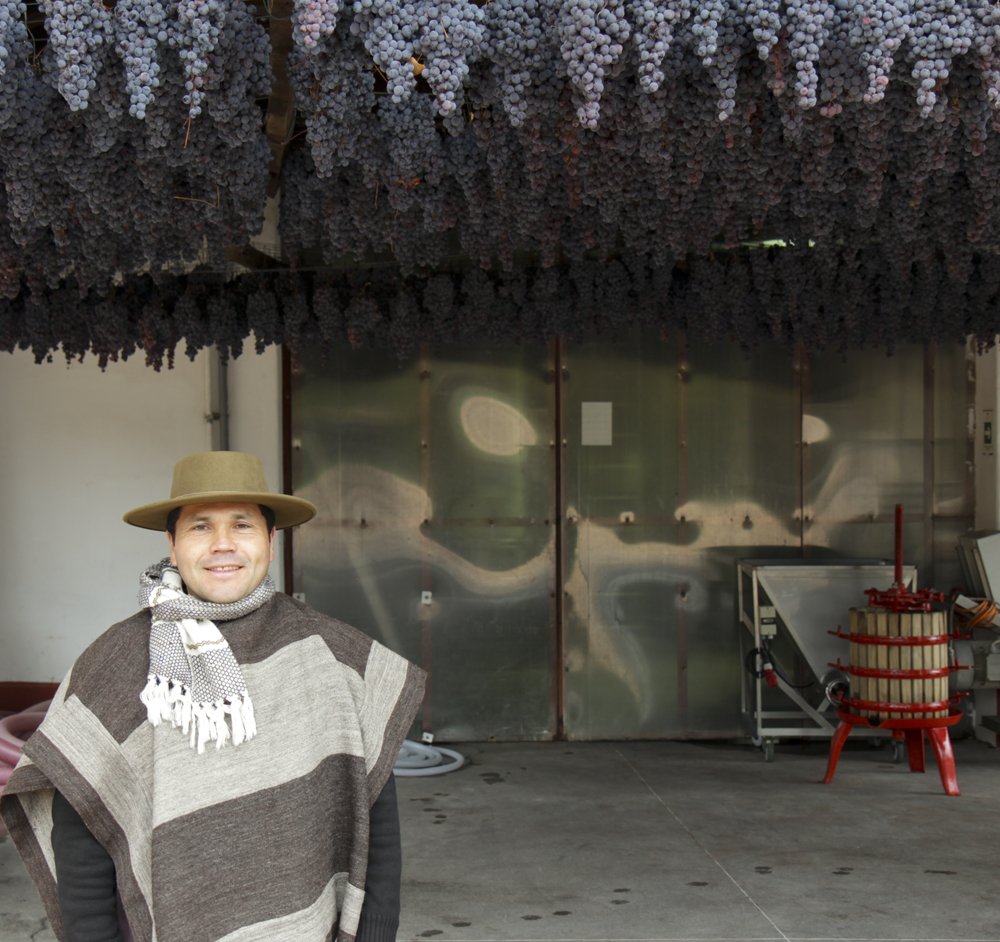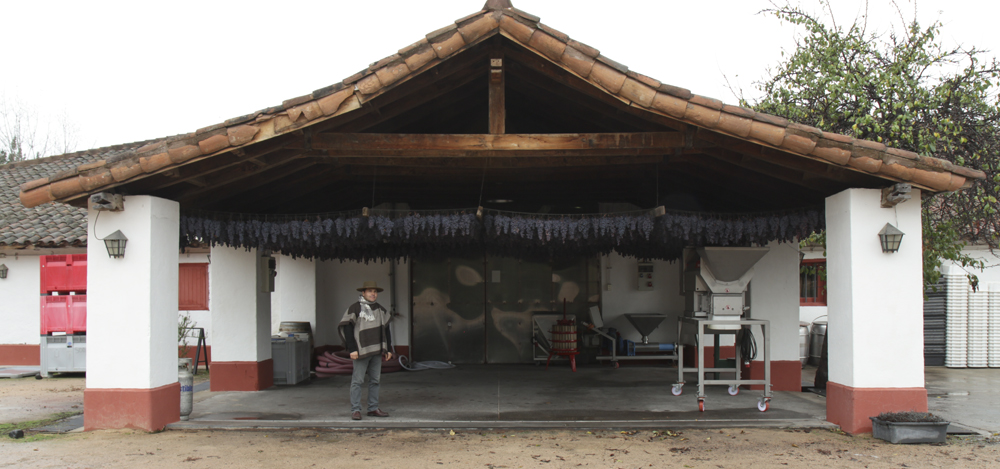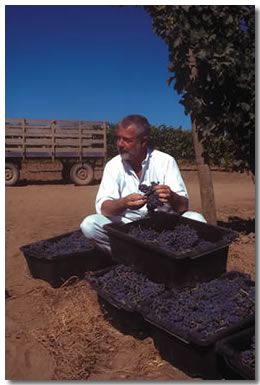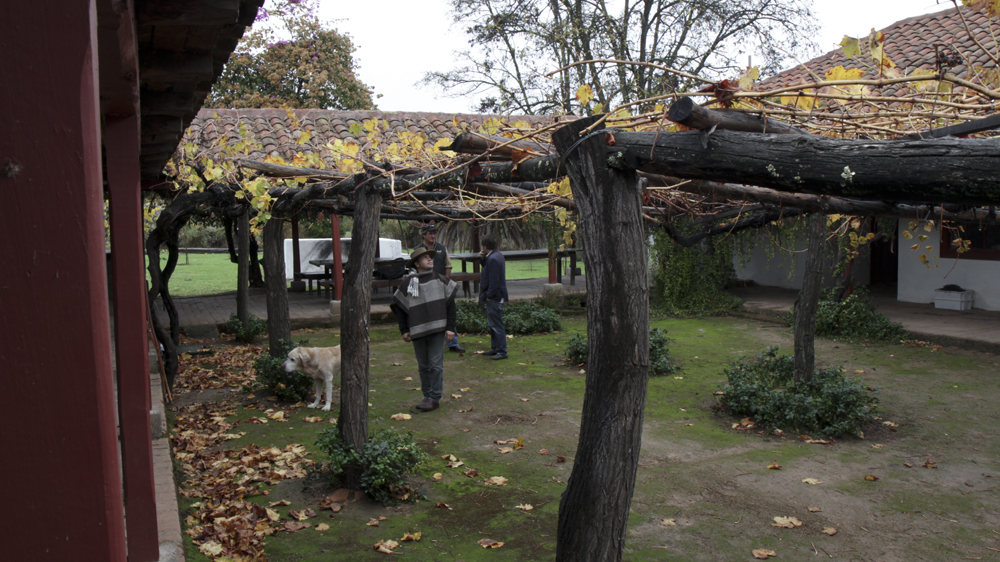
Count Francesco Marone Cinzano, owner of Tenuta Col d'Orcia, one of the historical cellars of Montalcino, fell for Chile, and specifically, La Reserva de Caliboro in the Maule region. Cinzano, from the famous Cinzano vermouth family, bought the Caliboro in 2005 with the commitment to create wines that are true to the region. The estate produces two wines: a Cabernet, Merlot blend and a late harvest Torontel.
We talk to winemaker Cesar Opazo, who helped to establish the estate in 1996, about Maule, old vines and the evolution of Caliboro.
Christopher Barnes: So Cesar, tell us about Caliboro.
Cesar Opazo: Caliboro is a town in the Maule Valley, very rural, rooted in the colonial wine country of Chile, historical of Chile.
And how is it historic?
As proof, in this area there are very old vines. Some older than 200 years. Some even more. Which shows how historic this area of the Maule Region is.

Who owns the estate now?
The owner of the place we are in right now is an Italian man, Francesco Marone Cinzano, who established himself here with the goal of showing the origin of Chilean viticulture through innovation and the rebirth of this winemaking culture.
What has Francesco Morone Cinzano done to the estate since he has arrived?
He says that, practically, it was all here. That he didn't do anything but to rebirth this kind of viticulture with a concept of reviving the peasant tradition of Caliboro.
When did you start making wine here?
We initiated this project in 1996, starting from zero: we brought genetic material from Montpellier, France, to Chile; established the vineyards; cleaned the fields and planted the vines.

What is the philosophy of winemaking here?
The concept is very simple: one man, one brand, one wine.
In terms of the different grapes that you grow here, talk about that a little bit.
There's a genetic foundation here, the strength of the project. We're talking Cabernet Sauvignon, Merlot and Cabernet Franc. But then we add Mediterranean varieties. Such as Alicante, Petit Verdot, Syrah, Barbera, Garnacha. That's an array that gives us the option and diversity to try and innovate in the Chilean industry.
And how has the winemaking changed over the time that you started making wine here?
Very little. We are going back to the ancient tradition of winemaking. For instance, the handling of our viticulture. We don't water our vineyards. We aim for the best territorial expression of the area. There's great concentration on the grape. We use native yeast for our fermentation. So we try to have a whole biological concept that's in balance with the environment, and with our wines.
So Cesar, tell us about the organic viticulture that goes on here.
Our viticulture, organic or biological, is based on respecting the experience that the local people have. We are located in a place that's appropriate for this kind of viticulture. We are by the bank of a river, which allows us to have a thermic influence. We are in a place that has space enough, which helps us to keep our vines healthy. So us men, all we do, is try to find the equilibrium in all this. So all the handling is based on the ancient style of viticulture. Of the pruning, of how they cultivated the vineyards in the traditional old way.
Tell us about Maule, what is the terroir that we are experiencing in this region?
The Maule, mainly in this part that we are now, has the most planted surface. It also produces a large quantity of grapes .There's a historical winemaking culture, so it makes me proud to work in this land because people have an experience inherited from their grandparents and their parents in the handling of the vineyards. That helps us greatly in our aim to maintain this area the traditional way. What makes the Maule different from other valleys is that there's an intention to keep the tradition, especially in this area where we are now, which is the coastal dry interior of the seventh Maulean region.
Cesar, tell us about the Torontel, that's a very interesting wine that you are making there.
The Torontel is a recovery of an old colonial varietal with the goal of reviving the tradition of a Mass style of wine, historical in Chile. And the idea was to reuse these vines which are more than 70 years old, which were abandoned. With the goal of positioning and showing the Chilean industry an attractive wine, of giving them a smile. And also the diversity of Chile. With the objective of rebirthing these historical varieties which were lost, so to speak.
The grape already comes with a certain concentration, since the vines are not watered. And when we hang them, that facilitates a stronger concentration to the point that they dehydrate, lose their water and have sugar. And that allows us, besides having the concentration, to bring out the natural yeast that the cluster itself has. Such that we have a natural biological product which perfectly represents the land that it comes from.

You also grow País here, that's a very interesting grape that has been growing in this region for a long time. Tell us a little bit about that.
Our vineyard has always stood out for our idea of innovation, but innovation based on looking for varieties that have an origin. When there's an origin there's a local identity. And with this País varietal we continue to do tests looking for the best adaptability to present a wine that's an innovation for Chile. That's the idea, experimenting to find the best potential of these varietals.
Cesar, you've lived abroad, you were in Italy for some time and decided to come back. Tell us about that, why did you make the decission to come back?
Mainly, what makes me proud, is to search the origins. The identity. And if I'm here in this project since Day 1, soon it'll be 20 years working this vineyard, it is because what attracted me was the people, which is the main concept to look for in the local origin. Wine is not just made from grapes, but also with people, who will also influence the success of a wine. And that as a Chilean, as a Maulean, as a peasant of this region, motivates me to maintain the peasant tradition.
Reviving the soil itself, working with my people, and making a product the world will know. A wine that will go from the Maule out to the world. Behind that bottle, there are people involved. Visiting Europe and other countries helped me realize that Chile has a diversity and a wonderful potential to show the world. And that's the objective I'm working on with my people here in Caliboro. Also with this Italian gentleman, who brings in the European culture, but we have here an Andean Chilean Mother Earth. And that's the mutual respect that goes hand-in-hand to make a great wine in harmony.
Watch a video interview with Francesco Marone Cinzano at his estate Col d'Orcia.









